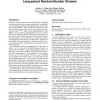247 search results - page 20 / 50 » On Pseudorandom Generators in NC |
ICITS
2009
13 years 5 months ago
2009
In this article, we discuss a naive method of randomness reduction for cryptographic schemes, which replaces the required perfect randomness with output distribution of a computat...
FOCS
1999
IEEE
13 years 11 months ago
1999
IEEE
Various efforts ([?, ?, ?]) have been made in recent years to derandomize probabilistic algorithms using the complexity theoretic assumption that there exists a problem in E = dti...
SRDS
2007
IEEE
14 years 1 months ago
2007
IEEE
Sensors that operate in an unattended, harsh or hostile environment are vulnerable to compromises because their low costs preclude the use of expensive tamper-resistant hardware. ...
FPGA
2008
ACM
13 years 9 months ago
2008
ACM
Stochastic simulations and other scientific applications that depend on random numbers are increasingly implemented in a parallelized manner in programmable logic. High-quality ps...
ADHOCNOW
2009
Springer
13 years 8 months ago
2009
Springer
The increased functionality of EPC Class1 Gen2 (EPCGen2) is making this standard a de facto specification for inexpensive tags in the RFID industry. Recently three EPCGen2 complian...

